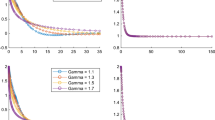We establish a compensator design via the separation principle in the practical sense for a class of semi-linear evolution equations in Hilbert spaces. Under a restriction imposed on the perturbation, which is bounded by an integrable function, we propose a nonlinear time-varying practical Luenberger observer to estimate the states of the system and prove that the Luenberger observer based on a linear controller stabilizes the system. An illustrative example is given to demonstrate the applicability of our theoretical results.
Similar content being viewed by others
References
M. Balas, “Towards a (more) practical control theory for distributed parameter systems,” Control and Dynamics Systems: Advances in Theory and Applications, Academic Press, New York (1980).
A. Benabdallah, “A separation principle for the stabilization of a class of time-delay nonlinear systems,” Kybernetika (Prague), 51, 99–111 (2015).
A. Benabdallah, I. Ellouze, and M. A. Hammami, “Practical exponential stability of perturbed triangular systems and a separation principle,” Asian J. Control, 13, 445–448 (2011).
D. S. Bernstein and D. C. Hyland, “The optimal projection equations for finite-dimensional fixed-order dynamic compensation of infinite-dimensional systems,” SIAM J. Control Optim., 24, 122–151 (1986).
P. D. Christofides, Nonlinear and Robust Control of PDE Systems: Methods and Applications to Transport-Reaction Processes, Birkhäuser Boston, Inc., Boston, MA (2001).
R. F. Curtain, “Compensators for infinite dimensional linear systems,” J. Franklin Inst., 315, 331–346 (1983).
R. F. Curtain, “Finite-dimensional compensators for parabolic distributed systems with unbounded control and observation,” SIAM J. Control Optim., 22, 225–276 (1984).
R. F. Curtain, “A comparison of finite-dimensional controller designs for distributed parameter systems,” Control Theory Technol., 9, 609–628 (1993).
R. F. Curtain, “Stabilization of boundary control distributed systems via integral dynamic output feedback of a finite-dimensional compensator,” Analysis and Optimization of Systems (Versailles, 1982), Lect. Notes Control Inf. Sci., 44, Springer, Berlin (1982), pp. 761–776.
R. F. Curtain and D. Salamon, “Finite-dimensional compensators for infinite-dimensional systems with unbounded input operators,” SIAM J. Control Optim., 24, 797–816 (1986).
R. F. Curtain and H. J. Zwart, An Introduction to Infinite Dimensional Linear Systems Theory, Springer-Verlag, New York (1995).
H. Damak and M. A. Hammami, “Stabilization and practical asymptotic stability of abstract differential equations,” Numer. Funct. Anal. Optim., 37, 1235–1247 (2016).
H. Damak, I. Ellouze, and M. A. Hammami, “A separation principle of a class of time-varying nonlinear systems,” Nonlinear Dyn. Syst. Theory, 13, 133–143 (2013).
R. Datko, “Extending a theorem of A. M. Liapunov to Hilbert spaces,” J. Math. Anal. Appl., 32, 610–616 (1970).
I. Ellouze, “On the practical separation principle of time-varying perturbed systems,” IMA J. Math. Control Inform., 37, No. 1, 1–16 (2019).
I. Ellouze and M. A. Hammami, “A separation principle of time-varying dynamical systems: a practical stability approach,” Math. Model. Anal., 12, 297–308 (2007).
R. Gressang and G. Lamont, “Observers for systems characterized by semigroups,” IEEE Trans. Automat. Control, AC-20, 523–528 (1975).
W. Harmon Ray, Advanced Process Control, McGraw-Hill, New York (1981).
W. He, S. S. Ge, B. V. Ee How, and Y. S. Choo, Dynamics and Control of Mechanical Systems in Offshore Engineering, Springer-Verlag, London (2014).
S. Kitamura, H. Sakairi, and M. Mishimura, “Observers for disturbuted parameter systems,” Electric. Eng. Jap., 92, 142–149 (1972).
A. Loria and E. Panteley, “A separation principle for a class of Euler–Lagrange systems,” New directions in nonlinear observer design (Geiranger Fjord, 1999), Lect. Notes Control Inf. Sci., vol. 244, Springer, London (1999).
Y. Orlov, Y. Lou, and P. D. Christofides, “Robust stabilization of infinite-dimensional systems using sliding-mode output feedback control,” Internat. J. Control, 77, 1115–1136 (2004).
A. Pazy, Semigroups of Linear Operators and Applications to Partial Differential Equations, Springer-Verlag, New York (1983).
Y. Qiang, J. W. Wang, and C. Y. Sun, “Observer-based output feedback compensator design for linear parabolic PDEs with local piecewise control and pointwise observation in space,” IET Control Theory Appl., 12, No. 13, 1812–1821 (2018).
Y. Sakawa and T. Matsushita, “Feedback stabilization for a class of distributed systems and construction of a state estimator,” IEEE Trans. Automat. Control, AC-20, 748–753 (1975).
G. Teschl, Ordinary Differential Equations and Dynamical Systems, Graduate Studies in Mathematics, American Mathematical Society, Providence, RI (2012).
B. Zhou, “Stability analysis of nonlinear time-varying systems by Lyapunov functions with indefinite derivatives,” IET Control Theory Appl., 11, 1434–1442 (2017).
Author information
Authors and Affiliations
Corresponding author
Additional information
Published in Ukrains’kyi Matematychnyi Zhurnal, Vol. 74, No. 8, pp. 1073–1085, August, 2022. Ukrainian DOI:https://doi.org/10.37863/umzh.v74i8.6152.
Rights and permissions
Springer Nature or its licensor (e.g. a society or other partner) holds exclusive rights to this article under a publishing agreement with the author(s) or other rightsholder(s); author self-archiving of the accepted manuscript version of this article is solely governed by the terms of such publishing agreement and applicable law.
About this article
Cite this article
Damak, H. Compensator Design Via the Separation Principle for a Class of Semilinear Evolution Equations. Ukr Math J 74, 1225–1239 (2023). https://doi.org/10.1007/s11253-023-02131-8
Received:
Published:
Issue Date:
DOI: https://doi.org/10.1007/s11253-023-02131-8



